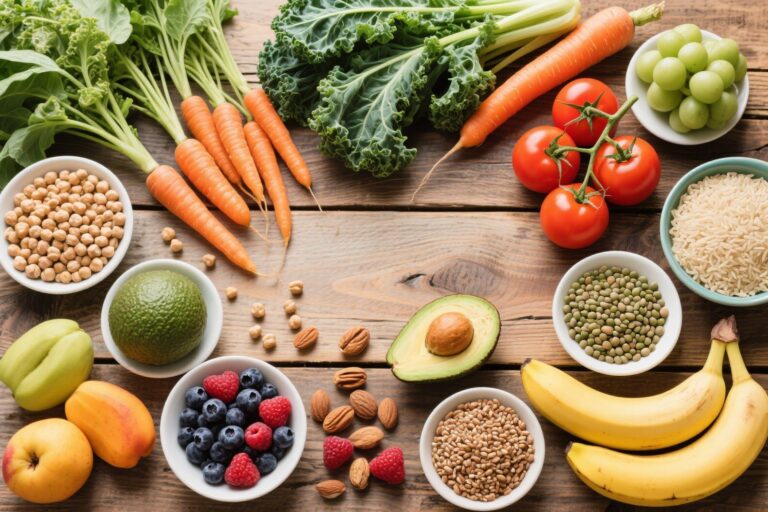Frequently Asked Questions (FAQs)
1. What is a plant-based diet?
A plant-based diet focuses on eating foods primarily from plants — including fruits, vegetables, legumes, nuts, seeds, whole grains, and healthy oils. It limits or avoids animal products like meat, dairy, and eggs. Unlike veganism, which is an ethical lifestyle, a plant-based diet is often health- or environmentally focused.
2. Can a plant-based diet provide enough protein?
Yes. A well-planned plant-based diet can easily meet your protein needs. Protein-rich plant foods include lentils, chickpeas, tofu, tempeh, quinoa, edamame, peanuts, and black beans. Even vegetables like spinach and broccoli contribute small amounts of protein.
3. Is a plant-based diet safe for kids and pregnant women?
According to the Academy of Nutrition and Dietetics, plant-based diets are safe and nutritionally adequate for all stages of life — including childhood, pregnancy, and lactation — when properly planned. Key nutrients to monitor include B12, iron, calcium, and omega-3s.
4. Will I lose weight on a plant-based diet?
Most people naturally lose weight on a whole-food, plant-based diet. Plant foods are high in fiber and low in calories, which helps with satiety and portion control. Research shows that plant-based eaters typically have lower BMIs and healthier body fat percentages.
5. How do I get Vitamin B12 on a plant-based diet?
Vitamin B12 isn’t found naturally in plant foods, so supplementation is essential. You can get B12 from fortified plant milks, nutritional yeast, or a B12 supplement. It’s inexpensive and crucial for nerve function and energy metabolism.
6. Is a plant-based diet more expensive?
It can be more affordable than meat-based diets. Staples like rice, oats, lentils, potatoes, and beans are some of the cheapest foods worldwide. While some meat alternatives and specialty vegan products are costly, whole plants are budget-friendly and accessible.
7. How long does it take to see results from a plant-based diet?
Some people report improved energy, digestion, and sleep within just a few days. Markers like cholesterol, blood pressure, and inflammation often improve within 3–6 weeks. Long-term benefits, including reduced disease risk, continue to grow over time.
8. Can I build muscle on a plant-based diet?
Absolutely. Many elite athletes and bodybuilders thrive on plant-based diets. Focus on high-protein plant foods, resistance training, and eating sufficient calories. Pea protein, soy, seitan, and legumes can help you meet your fitness goals.
9. What’s the difference between vegan and plant-based?
Veganism is a lifestyle that excludes all animal products — including clothing, cosmetics, and food — for ethical reasons. A plant-based diet is a way of eating focused on health and often includes fewer processed foods, even if it’s not 100% animal-free.
10. How do I start a plant-based diet as a beginner?
Start small. Try replacing one meal per day with a plant-based option. Stock up on basics like grains, beans, and veggies. Use recipes, plan ahead, and be kind to yourself — it’s a learning journey, not a test. Focus on progress, not perfection.
📚 References:
-
American Heart Association. (2019). Plant-Based Diets Shown to Lower Heart Disease Risk. https://www.heart.org/en/news/2019/08/21/plant-based-diets-shown-to-lower-heart-disease-risk
-
Esselstyn, C. B. (2001). Prevent and Reverse Heart Disease. Avery Publishing.
-
Ornish, D. et al. (1998). Intensive Lifestyle Changes for Reversal of Coronary Heart Disease. JAMA, https://pubmed.ncbi.nlm.nih.gov/9863851/
-
National Institutes of Health. (2020). Low-Fat Vegan Diet Improves Weight and Insulin Sensitivity. https://www.nih.gov/news-events/news-releases/low-fat-vegan-diet-improves-weight-insulin-sensitivity
-
Buettner, D. (2023). Blue Zones Diet Food List. Blue Zones. https://www.bluezones.com/2023/03/blue-zones-diet-food-list/
-
Kahleova, H. et al. (2019). Plant-Based Diet and Metabolism. Nutrients, 11(3), 556. https://www.mdpi.com/2072-6643/11/3/556
-
Harvard T.H. Chan School of Public Health. Fiber and Gut Health. https://www.hsph.harvard.edu/nutritionsource/carbohydrates/fiber/
-
Moayyedi, P. et al. (2004). The Treatment of IBS with Fiber. Gastroenterology, https://www.gastrojournal.org/article/S0016-5085(04)02152-0/fulltext
-
Barnard, N. et al. (2006). Vegan Diet and Glycemic Control in Type 2 Diabetes. Diabetes Care, 29(8), 1777–1783. https://diabetesjournals.org/care/article/29/8/1777/26691/Vegan-Diet-in-Type-2-Diabetes
-
United States Department of Agriculture. FoodData Central. https://fdc.nal.usda.gov/
-
Li, D. (2018). Plant-Based Diet and Inflammatory Markers. American Journal of Clinical Nutrition, https://academic.oup.com/ajcn/article/93/6/1103/4597922
-
Burris, J. et al. (2013). Diet and Acne: A Review of the Evidence. Dermatology Online Journal, https://escholarship.org/uc/item/7sk8f8s3
-
World Cancer Research Fund (WCRF). (2018). Diet, Nutrition, Physical Activity and Cancer: A Global Perspective. https://www.wcrf.org/dietandcancer/
-
World Health Organization (WHO). (2015). Q&A on Carcinogenicity of Red and Processed Meat. https://www.who.int/news-room/fact-sheets/detail/cancer
-
Harvard T.H. Chan School of Public Health. (2019). Plant-Based Diet and Diabetes Risk Reduction. https://www.hsph.harvard.edu/news/press-releases/plant-based-diet-diabetes-risk/
-
Iguacel, I. et al. (2021). Mental Health Outcomes in Plant-Based Diets: A Systematic Review. Nutrients, 13(4), 1182. https://www.mdpi.com/2072-6643/13/4/1182
-
NutritionFacts.org. Mental Health and Nutrition. https://nutritionfacts.org/topics/mental-health/
-
Poore, J. & Nemecek, T. (2018). Reducing Food’s Environmental Impacts through Producers and Consumers. Science, 360(6392), 987–992. https://science.sciencemag.org/content/360/6392/987
-
FAO (Food and Agriculture Organization of the United Nations). Livestock’s Long Shadow. https://www.fao.org/newsroom/detail/fao-releases-updated-dataset-on-global-livestock-emissions/en
-
Sentience Institute. Factory Farming: Global Impact. https://www.sentienceinstitute.org/factory-farming
-
ASPCA. The Truth About Factory Farming. https://www.aspca.org/animal-cruelty/farm-animal-welfare
-
Orlich, M. J. et al. (2013). Vegetarian Dietary Patterns and Mortality in Adventist Health Study 2. JAMA Internal Medicine, 173(13), 1230–1238. https://jamanetwork.com/journals/jamainternalmedicine/fullarticle/2540540
-
Longo, V. (2018). The Longevity Diet. Penguin Publishing Group. https://www.valterlongo.com/the-longevity-diet/
-
Physicians Committee for Responsible Medicine (PCRM). Plant-Based Starter Kit. https://www.pcrm.org/good-nutrition/plant-based-diets
-
Academy of Nutrition and Dietetics. (2016). Position on Vegetarian Diets. https://www.eatrightpro.org/news-center/position-papers/vegetarian-diets
-
NIH Office of Dietary Supplements. Micronutrients for Vegans and Vegetarians. https://ods.od.nih.gov/
Read Also: Mindful Eating: 13 Proven Hacks to Crush Cravings Without Giving Up What You Love.




